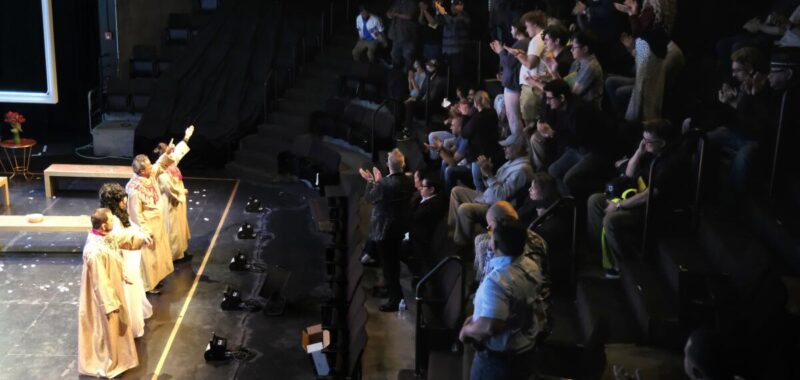Two plays down, five more to go.
As the 5 p.m. shows concluded, a lingering crowd filled the L.A. Theater Center’s lobby. With an hour and a half before the start of four more productions, some sparked conversations in the dimly lit lounging area, others stopped by the bar for a glass of wine and almost everyone stuck around for what would be a theatrical double feature.
In the midst of the Latino Theater Company’s three-weekend Encuentro festival, ending Nov. 10, the downtown theater complex has become home base for the country’s Latino theater scene — hosting between seven and 12 productions nightly from groups all over the U.S., Mexico and Puerto Rico.
“I first brought my kids just to come to get out of the house on the weekend,” Kelly Flores, librarian at Manual Arts High School and longtime fan of the company. “But we ended up seeing really poignant shows about what’s happening in our communities. And we haven’t stopped coming back since.”
The L.A.-based arts nonprofit has brought Latino stories to the stage for nearly 40 years. And for the past decade, the Encuentro festival has remained a tradition uniting Latino theater companies from around the world. The fest’s fourth iteration and 10th anniversary introduces the “We Are Here — Presente!” theme performed by 19 groups.
As more attendees arrive for the 8 p.m. plays, controlled chaos backstage takes hold at each of the center’s five theaters, which vary in size and perspective. A constant stream of clothing racks and ladders passes through the venue’s two floors. A final run-through ensures the cast and crew know their positions. Lighting technicians run through their settings for each scene. The theater custodian does one last vacuum between the aisles. And someone on a hydraulic lift double-checks each hanging fixture.
Standing by a cocktail table, actor Giorgia Valenti and co-director Carlos Armesto of Pitchblack Immersive Experiences in New York say they are excited to experience some of the other companies’ productions. Participating in their first Encuentro, they helped open the festival with “Odd Man Out, ” about a blind Argentine musician traveling home to Buenos Aires to face his past. Their show happens in darkness — the group relies on what the crowd can hear, smell, taste and feel to tell different stories.
“I want attending this festival to be my permanent job,” said Armesto, who wore a skinny scarf and round glasses. “This is an environment where you’re encouraged to connect with everybody and have a dialogue. You don’t see this anywhere else.”
The New York resident recalls feeling isolated when he got started in theater, more than a decade ago, due to his Latino background. But finding programming like Encuentro changed his mind.
“The festival is made to build a network and community but also to really understand each other’s artistic mission,” Valenti said. “It’s so exciting. I never expected to see this kind of cross-pollination.”
As participants in the festival, they get an assigned time to see each of the 19 productions. They expressed interest in seeing the Austin-based ProyectoTeatro’s “Cabarex 2: RevoLUZiones,” a comedic retelling of moments in Latino history, and fellow New York company Repertorio Español’s “La Golondrina,” the story of the mentorship between a singing coach and a student.
At a table nearby, a group of three friends had just arrived. Upon entering the glass-ceilinged waiting area, they said, they were shocked to hear a familiar corrido playing in the distance and see papel picado strung from the walls. When seeing a play in downtown, Angelica Reyes, a teacher at Santee High School, admitted she was expecting a more “white and bougie” looking space — instead, she said, “It looks like brown people actually created this.”
Reyes and her friends, self-described social activists, were drawn to Encuentro to see “Ayotzinapa (Situación Desaparecido),” about the 43 students who went missing in Mexico, from L.A.-based company Grupo de Teatro Sinergia. With high hopes for the production, the high school teacher said she was intrigued to see how this kind of art form told the unresolved tragedy.
“The reason that I’m not necessarily a theater person is because I haven’t seen myself or my stories represented in theater,” said Reyes. “It’s easier for white folks to be theater people because they see themselves in those stories.”
“Ayotzinapa (Situación Desaparecido),” she said, might bring her back to see another production.
According to avid theatergoers Juan Garcia and David Freire, the Latino Theater Company is like a gateway into the art form. Once casual fans, they consider the downtown company to be “home,” with plans to see a different play every night of the Encuentro weekend.
“It’s more economical for people to come here,” said Freire. “The tickets are not as expensive and you are still getting really wonderful, theatrical performances that capture all the diversity of the Latino community.”
Garcia added, “We can relate to some of the productions. These shows tell the stories of the working class and the immigrant experience, which are things that represent us both.”
As the clock ticks closer to the 8 p.m. curtain time, the lobby more clearly resembles a house party — a chatty, mingling crowd, flashing colorful lights and flowing red wine. Guadalupe Ramirez, a commercial photographer, sits on one of the corner couches and takes it all in. She is happy to see young people.
“This place is really breaking the barrier that the Latinos don’t come to the theater,” said Ramirez. “And if we don’t write our own stories, others are going to write them as they want. It’s important for us to tell it from our perspective.”
A voice comes over the loudspeaker, announcing that the four theater doors are open for seating. With that, the lobby empties as patrons head off to experience Encuentro.
The Encuentro festival runs through Sunday, Nov. 10. Tickets can be purchased here.

